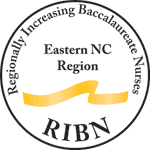RIBN Frequently Asked Questions

What is Eastern North Carolina RIBN?
The ENC RIBN program is a four-year nursing option that will concurrently admit and enroll students to both East Carolina University and one of these fourteen local community colleges:
- Beaufort County Community College
- Cape Fear Community College
- Carteret Community College
- Coastal Carolina Community College
- College of the Albemarle
- Craven Community College
- James Sprunt Community College
- Johnston Community College
- Lenoir Community College
- Nash Community College
- Pitt Community College
- Roanoke-Chowan Community College
- Sampson Community College
- Wayne Community College
This program provides a seamless associate to baccalaureate nursing education for top academic students. The first three years are spent at the community college campus along with at least one online course per semester at East Carolina University. Upon successful completion of the first three years, students take their fourth year at East Carolina University online. Admission to the program is competitive and students will be chosen on the basis of specific academic requirements.
What makes the ENC RIBN nursing educational model different than traditional two- or four-year nursing pathways?
This four-year concurrent nursing option provides a seamless transition from an associate degree to a baccalaureate degree in nursing. The students are concurrently enrolled at a designated community college and East Carolina University and will begin completing course requirements for a baccalaureate degree as soon as the first semester in the curriculum. Because the first three years of classes are held at the designated community college, students also have the opportunity to pay mostly community college tuition rates through the RIBN model.
Are there any other benefits of doing RIBN?
Students get the added support of a RIBN student success advocate, who is available to assist program participants. Students also get additional support from the RIBN cohort of students going through the same courses together.
What scholarship monies are available for ENC RIBN students?
Contact the Financial Aid office at the designated community college for more information.
If I’ve already completed some of the general education courses in the RIBN curriculum, can I start my nursing courses before year two?
You will not be required to re-take any courses for which you have successful credit; however, there is not an option to start your nursing courses before year two through the RIBN curriculum.
If I have taken the SAT before, do I have to retake to apply?
The SAT was redesigned in 2016 and the new version will be required for admission to RIBN in Fall 2018. We require a 500 in Reading/Writing and a 530 in Math. Because this is a competitive admissions program, so be aware that the higher your score, the more likely you are to be admitted.
Is it possible to take the ACT instead of the SAT?
You may take the ACT instead of the SAT to be eligible to apply for ENC RIBN. We require a 22 in Reading, 21 in English, and 22 in Math. Because this is a competitive admissions program, be aware that the higher your score, the more likely you are to be admitted.
What if I am missing some of the UNC minimum course requirements?
If you did not complete some of the required high school courses, you may take courses at the college level to satisfy these course requirements to be eligible to apply.
If I have completed college course work, will you still look at my high school GPA?
If you have completed at least 12 credit hours of college course work, we will consider your cumulative collegiate GPA, including any courses completed at the designated community college.
Can I apply to a community college or ECU’s other nursing options as well as RIBN?
Yes. Because nursing programs in the eastern North Carolina region are so competitive, we encourage you to apply to as many options for which you are interested and eligible. However, if you are accepted into the ENC RIBN program and choose to enroll, you will have to sign a letter of intent, which may be required before you know the status of applications with other programs.